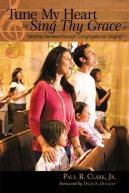 When she was in high school my older sister was a cheerleader. I grew up loving football, so when Teresa became a football cheerleader for Jackson High School I was excited that this might mean more inside scoop on the team and games. I remember one Friday when there was an away game and my parents had a schedule conflict and therefore we were at a church function rather than at the game. I waited up for my sister to get home so I could hear details about the game. Alas, when she got in she could tell me almost nothing about the ballgame and was even unsure whether the team had won or lost. Ugh! Really? You see, for her, cheerleading was its own activity, and for the most part the social interaction with friends was much more the focal point of what took place at the stadium than what was happening on the field. I suppose any activity of life has multiple layers of dynamics at any given time, but it does seem the Stephen Covey adage would be adhered to whereby we “keep the main thing the main thing.” When it comes to Christian worship, it I fear that church leaders have allowed, or even perpetrated worship being hijacked for other purposes.
When she was in high school my older sister was a cheerleader. I grew up loving football, so when Teresa became a football cheerleader for Jackson High School I was excited that this might mean more inside scoop on the team and games. I remember one Friday when there was an away game and my parents had a schedule conflict and therefore we were at a church function rather than at the game. I waited up for my sister to get home so I could hear details about the game. Alas, when she got in she could tell me almost nothing about the ballgame and was even unsure whether the team had won or lost. Ugh! Really? You see, for her, cheerleading was its own activity, and for the most part the social interaction with friends was much more the focal point of what took place at the stadium than what was happening on the field. I suppose any activity of life has multiple layers of dynamics at any given time, but it does seem the Stephen Covey adage would be adhered to whereby we “keep the main thing the main thing.” When it comes to Christian worship, it I fear that church leaders have allowed, or even perpetrated worship being hijacked for other purposes.
REALISM: WORSHIP DIVORCED FROM ITSELF
In the last few blog posts we have explored Michael Walters’ observations concerning forces at work against authentic Christian worship. In this post we look at the subtle, but sinister tendency of realism, in which worship is divorced from worship itself. While the statement may sound like doublespeak, the fact is that worship is ultimately about worship, and there are forces that attempt to use worship to accomplish some other objective. Trying to make worship useful to some other purpose ignores its very nature as a spiritual engagement with the living God, and much worse ignores the Lord’s command to “have no other gods before me” (Exodus 20:3). Part of what makes this so challenging is that whatever worship is being stolen to attempt may well be a good and respectful thing in and of itself. Conflating the two makes it difficult to rebuke the process without sounding as if one is opposed to whatever worship is being robbed to accomplish. A prime example of such conflating is the regular attempts to use worship for evangelism. Evangelism may well be a natural result of that which takes place in worship, but worship itself is just that, worship. Marva Dawn calls it (worship) a “royal waste of time” in her book by the same name. Walters notes, “It has no purpose, no utility, no value other than as our response to God for His gracious acts of salvation. Attempts to use worship for some other end are at best futile, and at worst dangerous. Worship has value for its own sake, and nothing else.”[1]
Those who believe its purpose is to serve as a means to church growth often hijack worship to use it as marketing or entertainment. If worship is not bringing in the proverbial sheeves, then it must be time to exercise creative entrepreneurial surgery. It is this same mentality that becomes impatient with the tenured pastor or music leader, tending to prefer the younger, more attractive and charismatic version of either. In this environment attitudes toward worship can easily drift toward little more than a promotion scheme to serve the purposes of inflated egos, ageism, or other idolatrous arrogances. It is just such driving forces that perpetuate the consumerism mentalities so prevalent in church culture of our day. Rather than facing issues whereby either leaders have failed to develop mature disciples, or congregations have been unfaithful participants in their own spiritual development, it appears many churches have settled for whatever pragmatic measure it takes to do what Whoopi Goldberg said in the movie, Sister Act, and “put butts in the seats.” Brian McClaren asks if the problem of keeping people interested in worship is not the natural result of employing evangelistic programs that are designed to appeal to self-interests of people. He asks can such an introduction to the faith fail to produce self-centered, consumeristic worshipers?[2] Based on worship attendance trends of the past twenty-plus years I would say the answer is no, as it clearly seems we have produced more “have it my way” consumers than we have developed true disciples.
Worship is its own reward. The praise and worship of the Triune God Who has created all that is, claimed and called us as His people into relationship with Him, provided the extravagant means of salvation that we may have access to Him, and Who is among us by the Holy Spirit to comfort and convict and guide, is a grace-gift worth every moment of our lives. Worship as a “scandalously useless activity” is of highest value. Pastors and worship ministry leaders must guard against gearing worship to perceived desires and felt needs of people, as this feeds the idea that we come to worship to get something of value “to take back into the real world.”[3] Pragmatism easily becomes a driving force that roots out obedience and response to spiritual revelation. So easily the God-given capacity to love turns in upon itself, homo incurvatus in se. Such is the demand that calls for “worship music I like,” or “sermons that make me feel good.” It is a far cry from aligning life patterns and regulating attitudes and actions according to biblical norms, whereby love of God and love of neighbor are central to living out worship.
While pragmatism has dominated worship leadership thinking for many evangelicals since the Frontier days of Charles Finney and others, there are signs that some leaders have renewed hunger for worship that will shift us away from ourselves and toward God. Surely such is the worship Jesus spoke of as worship in Spirit and truth, for such are the worshipers the Father seeks.
Let the glory of Your name
Be the passion of the Church
Let the righteousness of God
Be a holy flame that burns
Let the saving love of Christ
Be the measure of our lives
We believe You’re all to us
© 2010 Matt Maher Designee (Admin. by EMI Christian Music Publishing)
[1] Michael Walters Can’t Wait Til Sunday: Leading Congregations Toward Authentic Worship, 61.
[2] Brian McClaren A Generous Orthodoxy, 107.
[3] Walters, ibid.




